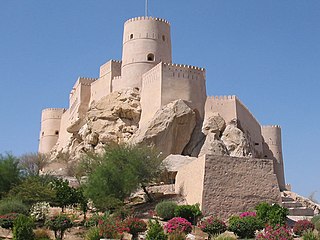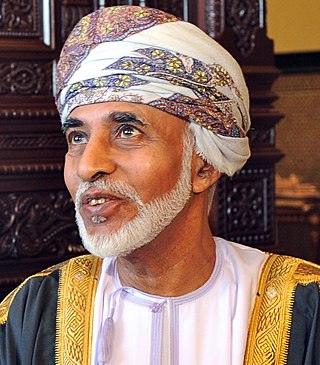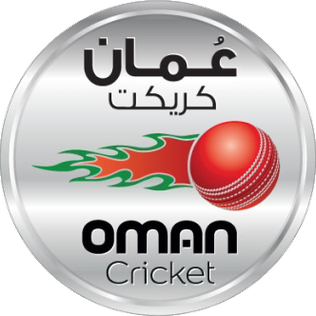This is a list of years in Oman .

The Gulf of Oman or Sea of Oman, also known as Gulf of Makran or Sea of Makran, is a gulf that connects the Arabian Sea with the Strait of Hormuz, which then runs to the Persian Gulf. It borders Iran and Pakistan on the north, Oman on the south, and the United Arab Emirates on the west.

Oman, officially the Sultanate of Oman, is a country located in West Asia. It is situated on the southeastern coast of the Arabian Peninsula, and spans the mouth of the Persian Gulf. It shares land borders with Saudi Arabia, United Arab Emirates, and Yemen, while sharing maritime borders with Iran and Pakistan. The capital and largest city is Muscat. Oman has a population of nearly 4.7 million and is ranked the 124th most-populous country. The coast is formed by the Arabian Sea on the southeast, and the Gulf of Oman on the northeast. The Madha and Musandam exclaves are surrounded by United Arab Emirates on their land borders, with the Strait of Hormuz and the Gulf of Oman forming Musandam's coastal boundaries.

Oman is the site of pre-historic human habitation, stretching back over 100,000 years. The region was impacted by powerful invaders, including other Arab tribes, Portugal and Britain. Oman once possessed the island of Zanzibar on the east coast of Africa as a colony. Oman also held Gwadar as a colony for many years.

The economy of Oman is mainly centered around its oil sector, with fishing and trading activities located around its coastal regions. When oil was discovered in 1964, the production and export increased significantly. The government has made plans to diversify away from oil under its privatization and Omanization policies. This has helped raise Oman's GDP per capita continuously in the past 50 years. It grew 339% in the 1960s, reaching a peak growth of 1,370% in the 1970s. Similar to the pricing of all other commodities, the price of oil is subject to significant fluctuations over time, especially those associated with the business cycle. A commodity's price will rise sharply when demand, like that for oil, outpaces supply; meanwhile, when supply outpaces demand, prices will fall.

Muscat is the capital and most populated city in Oman. It is the seat of the Governorate of Muscat. According to the National Centre for Statistics and Information (NCSI), the total population of Muscat Governorate was 1.72 million as of September 2022. The metropolitan area spans approximately 3,500 km2 (1,400 sq mi) and includes six provinces called wilayats, making it the largest city in the Arabian Peninsula by area. Known since the early 1st century AD as an important trading port between the west and the east, Muscat was ruled by various indigenous tribes as well as foreign powers such as the Persians, the Portuguese Empire and the Ottoman Empire at various points in its history. A regional military power in the 18th century, Muscat's influence extended as far as East Africa and Zanzibar. As an important port-town in the Gulf of Oman, Muscat attracted foreign traders and settlers such as the Persians, Balochs and Sindhis. Since the accession of Qaboos bin Said as Sultan of Oman in 1970, Muscat has experienced rapid infrastructural development that has led to the growth of a vibrant economy and a multi-ethnic society. Muscat is termed as a Beta - Global City by the Globalization and World Cities Research Network.

Qaboos bin Said Al Said was Sultan of Oman from 23 July 1970 until his death in 2020. A fifteenth-generation descendant of the founder of the House of Al Said, he was the longest-serving leader in the Middle East and Arab world at the time of his death, having ruled for almost half a century.

The Oman national association football team represents Oman in association football and is controlled by the Oman Football Association (OFA).
Oman Air is the flag carrier of Oman. Based at Muscat International Airport in Muscat, it operates domestic and international passenger services, as well as regional air taxi and charter flights.

The Sultanate of Muscat and Oman, also known briefly as the State of Muscat and Oman during the rule of Taimur bin Feisal, was a sovereign state that encompassed the present-day Sultanate of Oman and parts of present-day United Arab Emirates and Pakistan, in the second half of the 19th century and 20th century. Ruled by the Busaid dynasty, it was established as a result of the partition of the Omani Empire upon the death of its last ruler Said bin Sultan. The Sultanate transitioned into a new form of government after the palace coup of 23 July 1970 in which the sultan Said bin Taimur was immediately deposed in favor of his son Qaboos bin Said.

The Battle of Bicocca or La Bicocca was fought on 27 April 1522, during the Italian War of 1521–26. A combined French and Venetian force under Odet de Foix, Vicomte de Lautrec, was decisively defeated by an Imperial–Spanish and Papal army under the overall command of Prospero Colonna. Lautrec then withdrew from Lombardy, leaving the Duchy of Milan in Imperial hands.

The Oman men's national cricket team is the team that represents the country of Oman in international matches and is governed by Oman Cricket, which became an affiliate member of the International Cricket Council (ICC) in 2000, and gained associate status in 2014. The national side has played matches at the Twenty20 International level. On 24 April 2019, Oman achieved One-Day International status for the first time until 2023, after they beat tournament hosts Namibia by four wickets in 2019 ICC World Cricket League Division Two.

The Dhofar War took place from 1963 to 1976 in the province of Dhofar against the Sultanate of Muscat and Oman. The war began with the formation of the Dhofar Liberation Front, a Marxist group which aimed to create an independent state in Dhofar, free from the rule of the Omani Sultan Said bin Taimur. The rebels also held the broader goals of Arab nationalism which included ending British influence in the Persian Gulf region. Omani and British goals, on the other hand, were to safeguard Oman from communism and halt the spread of communist ideology as part of the broader Cold War.

The Oman Football Association is the governing body of football in Oman. It was founded in 1978, and has been a member of the Asian Football Confederation and of FIFA since 1980.

Oman is an absolute monarchy in which all legislative, executive, and judiciary power ultimately rests in the hands of the hereditary sultan, and in which the system of laws is based firmly on the monarchs made laws. Although a report by the U.S. State Department, based on conditions in 2010, summed up the human rights situation in the country by asserting that the government "generally respected the human rights of its citizens,", several international human-rights groups have described the state of human rights in Oman in highly critical terms. Article 41 of Oman's statute (constitution) criminalizes any criticism of the sultan, stating that "the sultan's person is inviolable and must be respected and his orders must be obeyed".
The Oman national football team is the national team of Oman that has represented Oman in international competitions since 1978. Although the team was officially founded in 1978, the squad was formed long before, and a proper football association was formed only in December 2005. The team is governed by the Oman Football Association.

The Jebel Akhdar War, also known as the Jebel Akhdar Rebellion or the Oman War, broke out in 1954 and again in 1957 in Oman, as an effort by the local Omanis in the interior of Oman led by their elected Imam, Ghalib al-Hinai, to protect the Imamate of Oman from the occupation plans of Said bin Taimur sultan of Muscat and Oman, backed by the British government, who were eager to gain access to the oil wells in the interior lands of Oman. Sultan Said received direct financing to raise an armed force to occupy the Imamate of Oman from Iraq Petroleum Company (IPC), a consortium of oil companies that was majorly owned by what is known today as Royal Dutch Shell, Total, ExxonMobil and British Petroleum (BP); the latter was majority-owned by the British government.

Muscat International Airport, formerly Seeb International Airport, is the main international airport in Oman and is located in Seeb, 32 km from the old city and capital Muscat within the Muscat metropolitan area. The airport serves as the hub for flag carrier Oman Air and Oman's first budget airline, Salam Air, and features flights to several regional destinations as well as some intercontinental services to Asia, Africa and Europe.

Haitham bin Tariq Al Said is Sultan and Prime Minister of Oman.
The COVID-19 pandemic in Oman was a part of the worldwide pandemic of coronavirus disease 2019 caused by severe acute respiratory syndrome coronavirus 2. The virus was confirmed to have reached Oman on 24 February 2020 when two citizens tested positive for COVID-19 after returning from Iran. As of 21 August 2021, the total number of cases registered in the sultanate is 300,914, of which 289,450 have recovered and 4,020 have died. Initially, the majority of the cases and deaths occurred in the expatriate community. By July 2020, as the pandemic entered its fourth month in the country, the majority of the cases and deaths had occurred among the citizens.